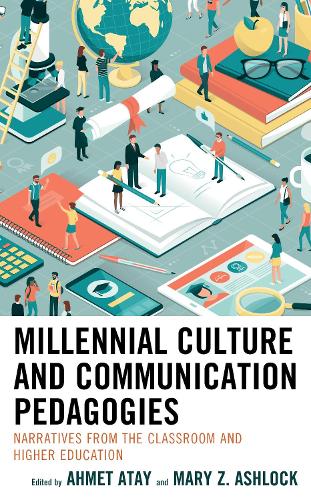
Millennial Culture and Communication Pedagogies: Narratives from the Classroom and Higher Education
(Hardback)
Publishing Details
Millennial Culture and Communication Pedagogies: Narratives from the Classroom and Higher Education
By (Author) Ahmet Atay
Edited by Ahmet Atay
Edited by Mary Z. Ashlock
Contributions by Mary Z. Ashlock
Contributions by Raymond Blanton
Contributions by Anne B. Bucalos
Contributions by Jennifer J. Calvert
Contributions by Rod Carveth
Contributions by Yea-Wen Chen
Contributions by Mark Congdon
Bloomsbury Publishing PLC
Lexington Books
15th November 2018
United States
Classifications
Professional and Scholarly
Non Fiction
378.00842
Physical Properties
Hardback
286
Width 159mm, Height 236mm, Spine 27mm
590g
Description
This book examines the ways in which faculty and staff at the higher education level teach and communicate with their millennial students and colleagues. The contributors address how millennials' academic and non-academic interests and everyday performances within and outside of higher education influence how faculty and staff communicate with them. This book delves into how millennials can become more adaptable in their communication with others in society especially in higher education, be it from different generations, or cultures that may or may not communicate the way they do. The contributors argue that millennial culture should be carefully studied by instructors, researchers, and administrators to create a better classroom and educational experience and also improve the level of communication among these constituencies.
Reviews
Building from the premise that the Millennial Generation has experienced unprecedented global change, the essays in Millennial Generation and Pedagogy brilliantly complicate our understandings of this population of students, some of whom are now emerging faculty. Authors write from their personal experience of being a Millennial or having taught Millennial students. Anyone who has a stake in developing an intersectional approach to teaching and mentoring must read this book. -- Alberto Gonzlez, Bowling Green State University
This is an insightful and useful collection of essays that productively engage and apply communication theory to better understand and engage millennials--as students and as colleagues. When it is so easy to shore up stereotypes about this generation, these scholars take millennials seriously as meaningful participants in teaching and learning, as people constituted in enduring and complex cultural relationships who are capable of agency and action. Readers who are researchers will find avenues for continued and increasingly nuanced investigation; readers who are teachers will find paths forward in mutual understanding and dialogue; and readers who are students will find themselves better prepared to engage in conversations about (and resist mischaracterizations of) who they are and can become in the world. -- Deanna L. Fassett, San Jos State University
Author Bio
Mary Z. Ashlock is associate professor of communication at the University of Louisville. Ahmet Atay is associate professor of communication and the chair of the Womens, Gender, and Sexuality Studies Program at the College of Wooster.
